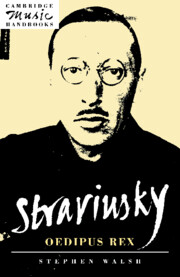Book contents
2 - Of masks, masses and magic
Published online by Cambridge University Press: 18 December 2009
Summary
Anyone who has ever tried to follow the plot of Stravinsky's Oedipus rex intelligently with no prior knowledge of the story will know that it is in fact an impossible task. Even for the dwindling tribe of Latin scholars, there is little hope of understanding exactly why, for example, Oedipus takes so long to realise his true situation as King of Thebes, for the simple reason that in compiling the text Cocteau seems deliberately to have left out such vital information. These omissions are usually attributed to snobbery. Stravinsky himself came round to some such opinion: ‘The line “And now you will hear the famous monologue, ‘The Divine Iokaste is dead’ ”, is intolerable snobbery. Famous to whom? And no monologue follows, but only a four-word singing telegram.’ But the sketchy nature of Cocteau's dramaturgy is closely bound up with the whole theatrical genre of the work, with its conscious use of an arcane language, its statuesque stage idiom, its allusive, tableau-like format. In a tangible sense, Oedipus rex is not only about the fate of a king called Oedipus; it is also about the ways in which such a profound but apparently remote tale can be given meaning to modern audiences in the modern theatre. As such, it is by no means isolated, either in Stravinsky's work or in the theatre of his day. So before examining the opera-oratorio itself, it will be worth looking at its context in the work of Cocteau and others.
- Type
- Chapter
- Information
- Stravinsky: Oedipus Rex , pp. 11 - 22Publisher: Cambridge University PressPrint publication year: 1993

